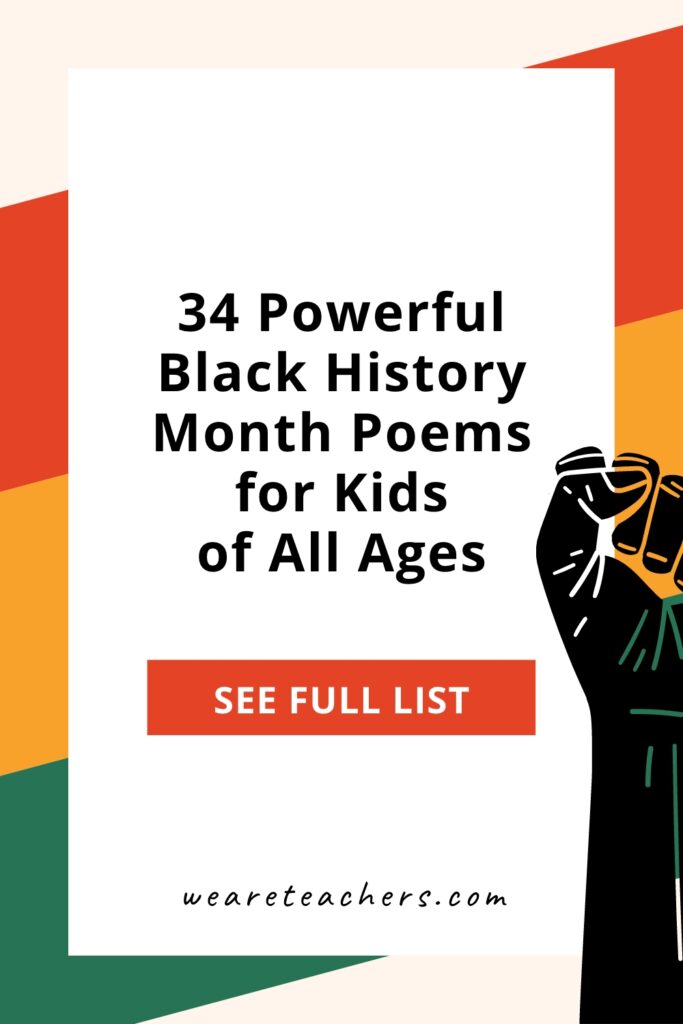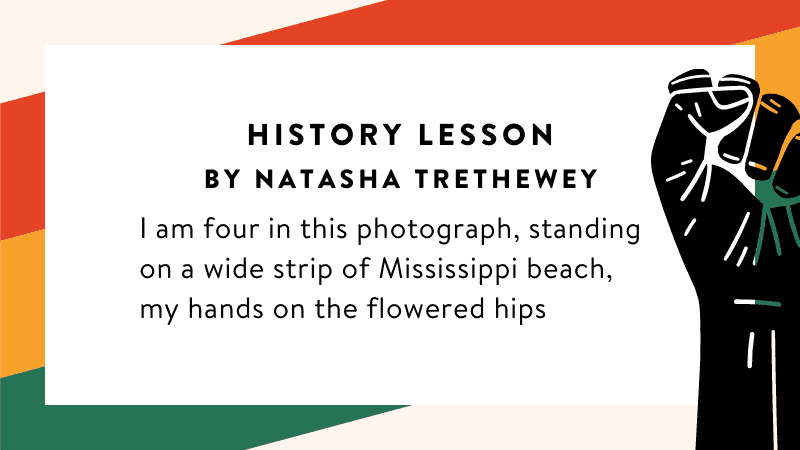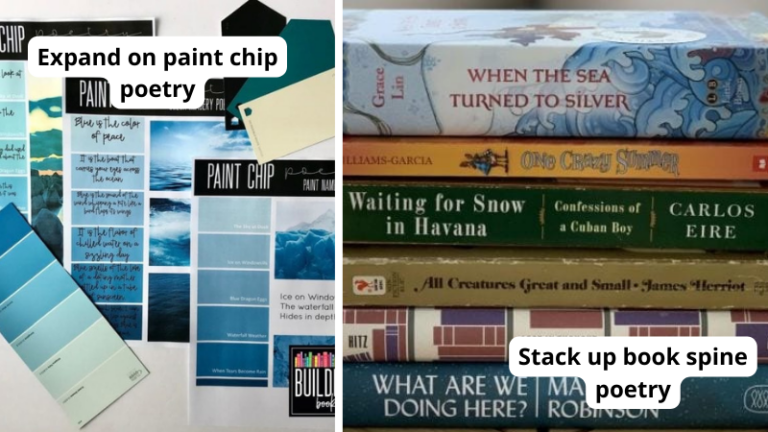Black history is American history, so it should be recognized every day. That said, every February, we have an opportunity to educate our students about the important events and figures that shaped this nation, while highlighting the realities we’re still facing today. To enhance these conversations, we’ve put together this list of powerful Black History Month poems for kids of all ages.
Note: Due to the nature of this topic, some of the upper-grade poems include references to slavery, violence, and death. Please review the poems before using them with your students to make sure they’re appropriate.
Black History Month Poems for Elementary School Kids
1. Life Doesn’t Frighten Me by Maya Angelou
“Shadows on the wall …”
Born Marguerite Annie Johnson, Maya Angelou was a poet, novelist, educator, memoirist, actress, civil rights activist, and so much more. She was shaped by experiences while living overseas in Egypt and Ghana, and worked alongside Malcolm X and Martin Luther King Jr. (who was, tragically, assassinated on Angelou’s birthday). Her autobiography I Know Why the Caged Bird Sings (1970) was the first bestseller written by an African American woman. “On the Pulse of Morning,” one of her most famous poems, was recited at the 1993 inauguration of President Bill Clinton. Angelou received countless awards and earned more than 50 honorary degrees from various universities.
2. Knoxville, Tennessee by Nikki Giovanni
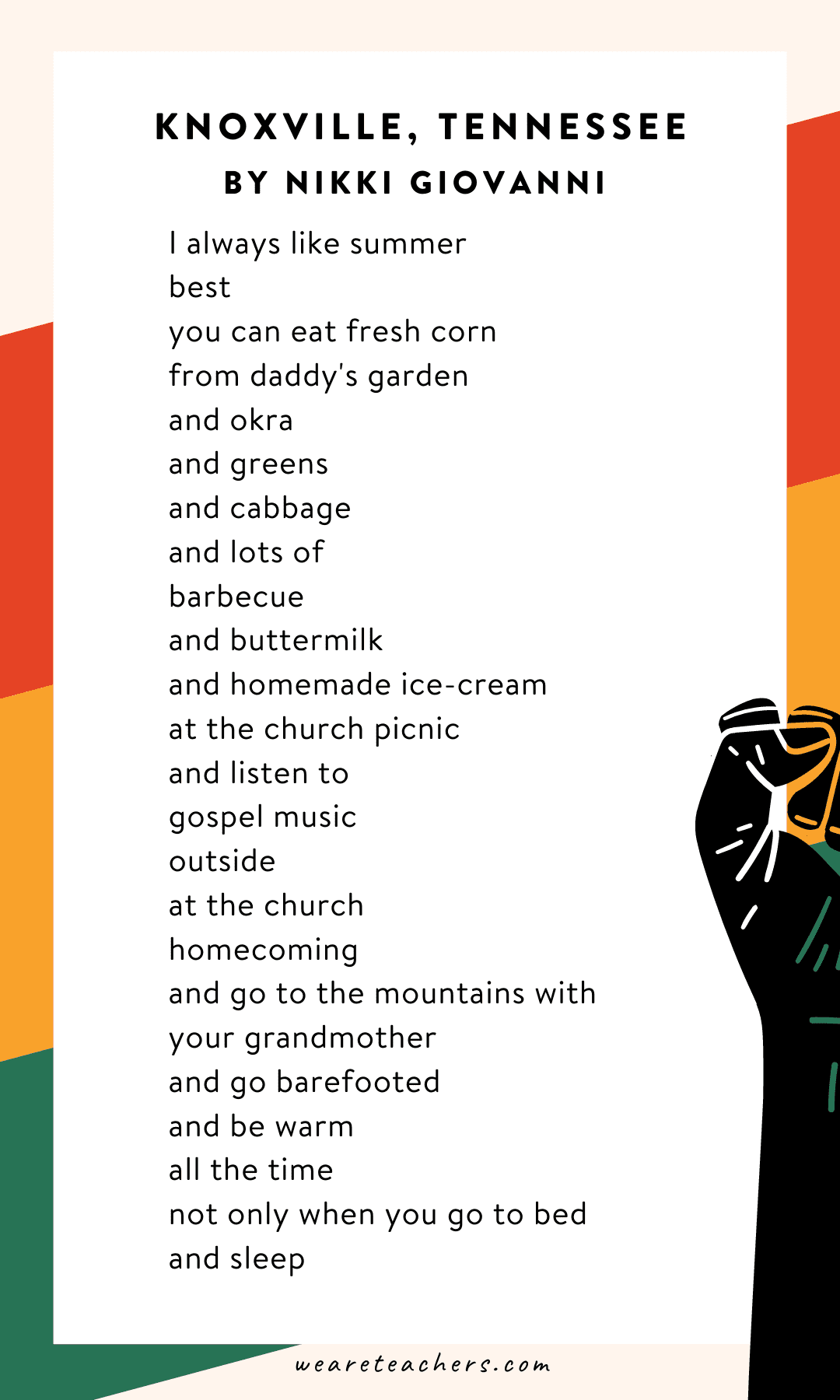
“I always like summer best …”
Nikki Giovanni initially wrote collections of poetry surrounding the militant themes of the Black Arts Movement. Eventually, she went on to publish 11 illustrated children’s books and penned poems such as Knoxville, Tennessee. She was the first recipient of the Rosa Parks Woman of Courage Award.
3. Won’t you celebrate with me by Lucille Clifton
“born in babylon / both nonwhite and woman …”
Lucille Clifton’s first book of poems, Good Times (Random House, 1969), was recognized by the New York Times as one of the best books of the year. Five years later, she left her government job and became a prolific poet, serving as Maryland’s Poet Laureate from 1979 to 1985. Her many accomplishments included winning the National Book Award, an Emmy Award, and being nominated for a Pulitzer Prize.
4. Tending by Elizabeth Alexander
“In the pull-out bed with my brother …”
Elizabeth Alexander currently serves as a Chancellor of the Academy of American Poets. She was chosen by Stephen Dunn, Jane Hirshfield, and Lucille Clifton to receive the Jackson Poetry Prize from Poets & Writers. Alexander’s memoir, The Light of the World (Grand Central Publishing, 2015), was a finalist for the Pulitzer Prize. In 2009, she composed “Praise Song for the Day” and recited it at President Barack Obama’s first Presidential Inauguration.
5. Mother to Son by Langston Hughes
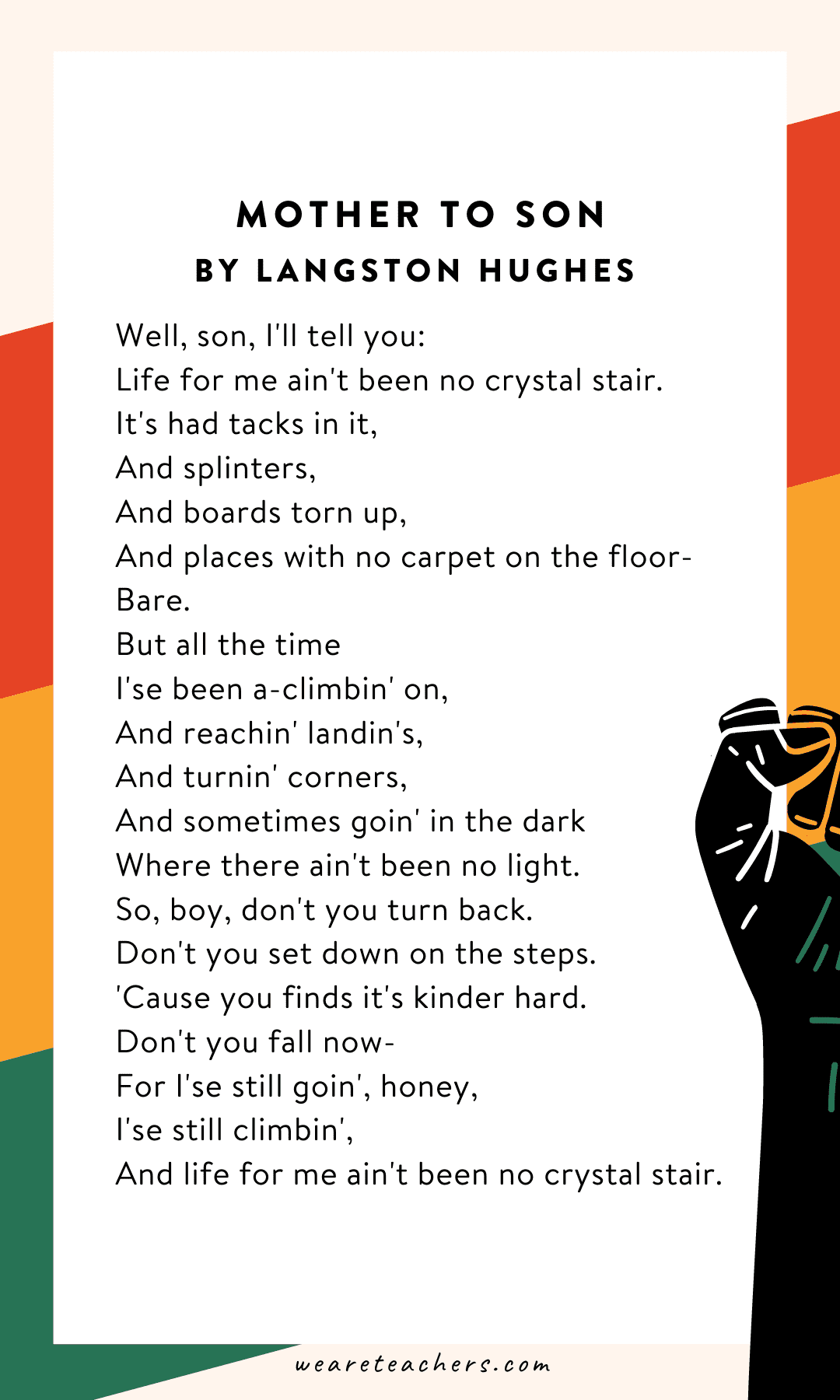
“Life for me ain’t been no crystal stair.”
James Mercer Langston Hughes wrote many famous poems that are perfect for sharing with kids during Black History Month. He began writing poetry in his teens. After high school, he completed a year at Columbia University and worked as a cook, busboy, and seaman as he traveled to Mexico, Africa, and Europe. His first book of poetry, The Weary Blues (Knopf, 1926), received mixed reviews, but his first novel, Not Without Laughter (Knopf, 1930), won the Harmon Gold Medal for literature. Hughes was known for the insightful, relatable way he portrayed Black life from the 1920s through the 1960s in America.
6. Dirt by Kwame Dawes
“We who gave, owned nothing …”
Kwame Dawes was born in Ghana, raised in Kingston, and went on to study and teach in New Brunswick, Canada. His Progeny of Air (Peepal Tree Press) received the Forward Poetry Prize for Best First Collection. In addition to his poetry, Daws has published several works of fiction and edited many anthologies. His numerous honors include a Guggenheim Fellowship for Poetry, the Musgrave Silver Medal, and an Emmy Award. He currently serves as a Chancellor’s Professor of English at the University of Nebraska.
7. A Place in the Country by Toi Derricotte
“We like the houses here.”
Toi Derricotte has published numerous books of poetry and has earned honors including the Frost Medal from the Poetry Society of America, the Barnes & Noble Writers for Writers Award, and fellowships from the Guggenheim Foundation, Rockefeller Foundation, and the National Endowment for the Arts. Derricotte is professor emerita of English at the University of Pittsburgh and served as a Chancellor of the Academy of American Poets from 2012 to 2017.
8. The Tradition by Jericho Brown
“Aster. Nasturtium. Delphinium.”
Before earning his Ph.D., Jericho Brown worked as a speechwriter for the mayor of New Orleans. His work The Tradition (Copper Canyon Press, 2019) earned him the 2020 Pulitzer Prize for poetry. Additional honors include a Whiting Writer’s Award, fellowships from the Guggenheim Foundation and the National Endowment for the Arts, as well as the 2022 Academy of American Poets Fellowship. Currently, Brown is an associate professor of English and Director of the Creative Writing Program at Emory University.
Black History Month Poems for Middle and High School Kids
9. For Trayvon Martin by Reuben Jackson
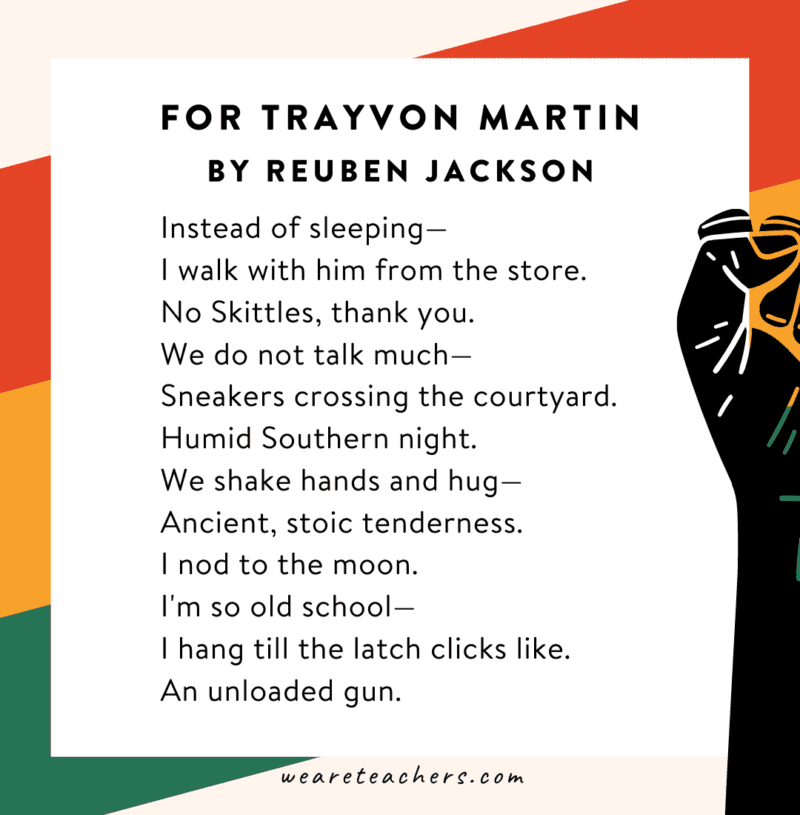
“Instead of sleeping / I walk with him from the store …”
For more than 20 years, Reuben Jackson served as curator of the Smithsonian’s Duke Ellington Collection in Washington, D.C. An educator and mentor with the Young Writers Project, Jackson’s many music reviews appeared in the Washington Post and other publications.
10. Facing It by Yusef Komunyakaa
“My black face fades …”
Yusef Komunyakaa’s formative years came right at the beginning of the Civil Rights Movement. After serving as a correspondent in the U.S. Army and earning a Bronze Star as managing editor of the Southern Cross during the Vietnam War, he began writing poetry. Over the years, he’s published numerous poems and books and received multiple honors including the 2011 Wallace Stevens Award and a fellowship from the National Endowment for the Arts. Komunyakaa was elected a Chancellor of the Academy of American Poets in 1999 and currently serves as a distinguished senior poet in New York University’s graduate creative writing program.
11. February 12, 1963 by Jacqueline Woodson
“I am born on a Tuesday at University Hospital …”
Jacqueline Woodson has written more than 30 books for children and adults, earning honors such as the Coretta Scott King Award, the National Book Award, the Newbery Honor award, and the Margaret A. Edwards Award for lifetime achievement in writing for young adults. From 2018 to 2019 she was the National Ambassador for Young People’s Literature, and she served as the Poetry Foundation’s Young People’s Poet Laureate from 2015 to 2017.
12. Frequently Asked Questions: #7 by Camille T. Dungy
“Is it difficult to get away from it all once you’ve had a child?”
The author of four collections of poetry and editor of anthologies, Camille T. Dungy’s honors include two NAACP Image Award nominations, NEA Fellowships in poetry (2003) and prose (2018), and two Hurston/Wright Legacy Award nominations. Dungy is currently a professor at Colorado State University. Her works can be found in more than 30 anthologies.
13. To the woman I saw today who wept in her car by Bianca Lynne Spriggs
“Woman, I get it.”
Bianca Lynne Spriggs has published five collections of poems and co-edited three poetry anthologies. With a focus on the connection between the identity of Black women in America’s South, art, and community, Spriggs draws from folklore, mythology, science fiction, and surrealism. Her honors include five Artist Enrichment Grants from the Kentucky Foundation for Women, an Al Smith Individual Artist Fellowship in Poetry, and the Sallie Bingham Award for feminist expression in the arts.
14. Virginia Is for Lovers by Nicole Sealey
“At LaToya’s Pride picnic …”
A former executive director for the Cave Canem Foundation, Nicole Sealey has been honored with the Drinking Gourd Chapbook Poetry Prize and was a finalist for the 2018 PEN Open Book Award. Sealey was also the recipient of a 2014 Elizabeth George Foundation Grant.
15. Truth by Gwendolyn Brooks
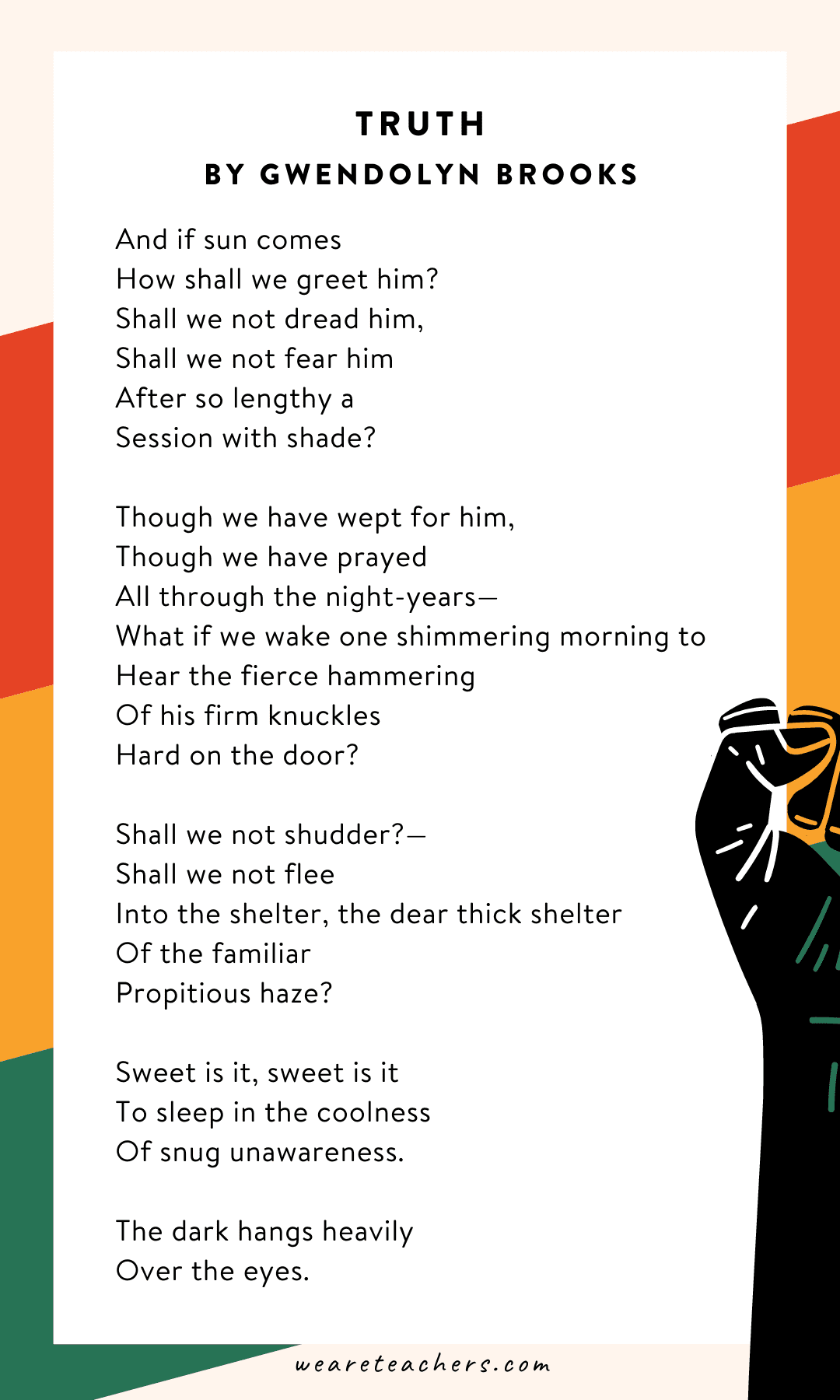
“And if sun comes …”
In her poetry, Gwendolyn Elizabeth Brooks often wrote about ordinary people and their daily struggles and celebrations. In 1950, she became the first Black American to win a Pulitzer Prize. She went on to become the Poet Laureate of Illinois and the United States. She was the first Black woman inducted into the American Academy of Arts and Letters.
16. Black Laws by Roger Reeves
“Fuss, fight, and cutting the huckley-buck …”
Roger Reeves’ poems have appeared in numerous journals, earning him a 2013 NEA Fellowship, two Bread Loaf Scholarships, a Ruth Lilly Fellowship by the Poetry Foundation, two Cave Canem Fellowships, and an Alberta H. Walker Scholarship from the Provincetown Fine Arts Work Center. Reeves is currently an assistant professor of poetry at the University of Illinois, Chicago.
17. I saw Emmett Till this week at the grocery store by Eve L. Ewing
“looking over the plums, one by one …”
Eve Louise Ewing is a poet, author, visual artist, and sociologist. She’s conducted research in the sociology of education on school closures, specifically in Chicago. A former editor at Seven Scribes, Ewing published a collection of poetry centered around the Chicago race riot of 1919. The tenured professor at the School of Social Service Administration at the University of Chicago is also the author of Marvel’s Ironheart comic book series.
18. Eddie Priest’s Barbershop & Notary by Kevin Young
“Closed Mondays …”
As a student at Harvard University, Kevin Young joined the Dark Room Collective, a community of Black writers. The author of many books of poetry and nonfiction essays, he was awarded a Stegner Fellowship from Stanford University, the Quill Award in Poetry, and the Paterson Award for Sustained Literary Excellence. After serving as the Atticus Haygood Professor of Creative Writing and English and curator of Literary Collections and the Raymond Danowski Poetry Library at Emory University for roughly a decade, Young is currently the director of the Smithsonian Institution National Museum of African American History and Culture and the poetry editor of the New Yorker.
19. BLK History Month by Nikki Giovanni
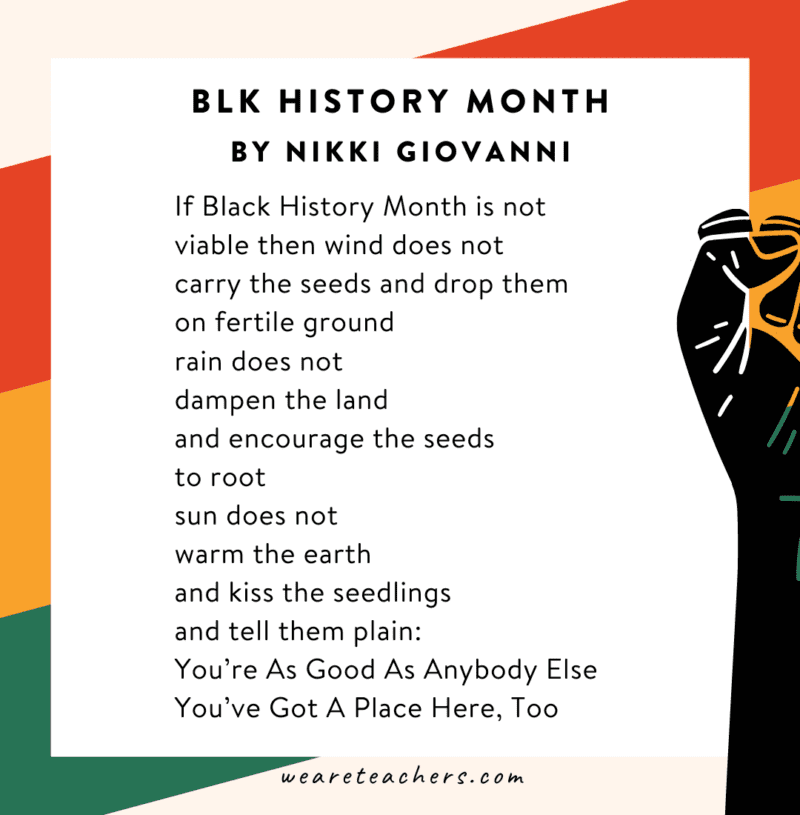
“If Black History Month is not viable …”
20. Coal by Audre Lorde
“Is the total black, being spoken …”
Audre Lorde was an influential radical feminist, professor, writer, and civil rights activist. She described herself as a “black, lesbian, mother, warrior, poet” who “dedicated both her life and her creative talent to confronting and addressing injustices of racism, sexism, classism, and homophobia.” As a poet, she was masterful and left behind an incredible legacy.
21. Nina’s Blues by Cornelius Eady
“Your body, hard vowels …”
The author of several collections of poetry, Cornelius Eady was a finalist for the 2001 National Book Award in Poetry and nominated for the Pulitzer Prize. Along with Toi Derricotte, Eady founded Cave Canem in 1996. The nonprofit organization provided Black poets with fertile ground for intellectual engagement and critical debate. Eady’s honors include a Lila Wallace-Reader’s Digest Award, the Prairie Schooner Strousse Award, and fellowships from the National Endowment for the Arts, Rockefeller Foundation, and the Guggenheim Foundation. Eady is currently a professor at SUNY Stony Brook in Southampton.
22. Rwanda: Where Tears Have No Power by Haki R. Madhubuti
“Who has the moral high ground?”
Haki R. Madhubuti is an educator, author, publisher, and poet. Among his greatest accomplishments is the founding of Third World Press, the oldest independent Black publishing house in the United States. His many honors include the Distinguished Writers Award, American Book Award, and fellowships from the National Endowment for the Arts and the National Endowment for the Humanities.
23. History Lesson by Natasha Trethewey

“I am four in this photograph …”
Natasha Trethewey, the author of five collections of poetry, served two terms as the Poet Laureate of the United States. She is the recipient of fellowships from the Guggenheim Foundation, the Academy of American Poets, the Rockefeller Foundation, the National Endowment for the Arts, the Beinecke Library at Yale, and the Radcliffe Institute for Advanced Study at Harvard. She has also served as a Chancellor of the Academy of American Poets since 2019 and was awarded the 2020 Rebekah Johnson Bobbitt Prize in Poetry for Lifetime Achievement from the Library of Congress.
24. Alternate names for black boys by Danez Smith
“1. smoke above the burning bush.”
Danez Smith is a founding member of the multicultural, multigenre Dark Noise Collective. Published in numerous journals and magazines, they have been honored with the Lambda Literary Award and the Kate Tufts Discovery Award, as well as fellowships from Cave Canem, the McKnight Foundation, and Voices of Our Nation (VONA). They were also named a 2011 Individual World Poetry Slam finalist.
25. The Gospel of Barbecue by Honorée Fanonne Jeffers
“Long after it was necessary / Uncle Vess ate the leavings …”
In her work, Fanonne Jeffers takes a close look at race, culture, religion, and family. Her very first book, The Gospel of Barbecue (2000), was selected by Lucille Clifton for the Stan and Tom Wick poetry prize and was a 2001 Paterson Poetry prize finalist. Among her many honors, Jeffers received fellowships from the National Endowment for the Arts and won the Harper Lee Award for Distinguished Writer of the Year. Currently, Jeffers is an associate professor of English at the University of Oklahoma, where she teaches creative writing.
26. Billie Holiday by E. Ethelbert Miller
“Sometimes the deaf / hear better than the blind …”
Self-described “literary activist” E. (Eugene) Ethelbert Miller earned a BA in African American studies from Howard University and serves on the board of progressive multi-issue think tank the Institute for Policy Studies. In addition to his poetry collections, Miller authored a memoir, as well as edited multiple anthologies. The recipient of the 1993 Columbia Merit Award, First Lady Laura Bush honored him at the White House. Miller held many academic positions, including director of the African American Studies Resource Center at Howard University since 1974.
27. Ballad of Birmingham by Dudley Randall
“Mother dear, may I go downtown …”
Dudley Randall started writing at just 13 years old with his first poem published in the Detroit Free Press. He graduated from high school three years later and went on to work at Ford Motor Company until he was laid off. While working as a postal carrier, he befriended poet Robert Hayden. Randall was drafted and served during WWII before earning a BA in English and an MA in Library Science. After working as a librarian and poet-in-residence at several universities, he became involved in the Black Arts Movement, established Broadside Press, and published works by Black poets.
28. Sonnet by James Weldon Johnson
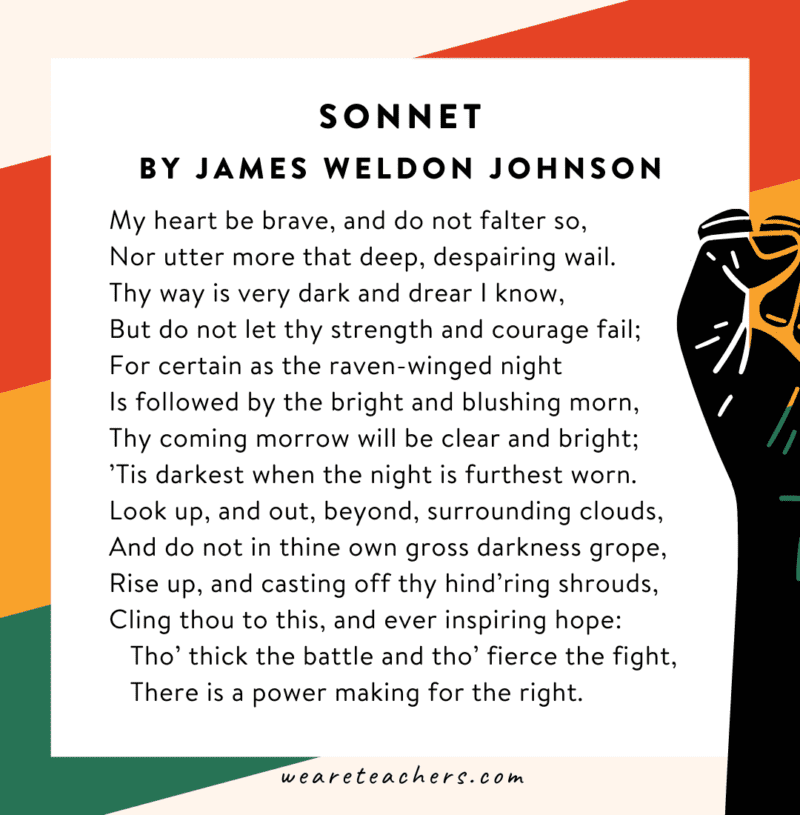
“My heart be brave, and do not falter so …”
James Weldon Johnson was a writer, civil rights activist, and leader of the National Association for the Advancement of Colored People (NAACP). His poems, anthologies, spirituals, and novel became known during the Harlem Renaissance. Johnson wrote the lyrics while his brother, J. Rosamond Johnson, composed the music for “Lift Every Voice and Sing,” later known as the Negro National Anthem. President Theodore Roosevelt appointed Johnson as U.S. Consul in Nicaragua and Venezuela. He later became the first Black professor at New York University.
29. Malcolm X, February 1965 by E. Ethelbert Miller
“I will die this month.”
30. The Slave Auction by Frances Ellen Watkins Harper

“The sale began—young girls were there …”
Frances Ellen Watkins Harper was a poet, journalist, fiction writer, and activist who published many collections of poetry, several novels, and essay collections. During Reconstruction, she fought for women’s rights, civil rights, and equal educational opportunities. She co-founded the National Association of Colored Women, was a member of the American Women’s Suffrage Association, and served as director of the American Association of Colored Youth.
31. In Memoriam: Martin Luther King, Jr. by June Jordan
“honey people murder mercy U.S.A.”
June Millicent Jordan has several poems perfect for sharing with older kids during Black History Month. In addition to being a poet, she was also a teacher, essayist, and activist. Passionate about using Black English in her poetry and writing (and encouraging others to treat it as its own language), the themes she explored included race, gender, representation, and immigration. In 2019, the National LGBTQ Wall of Honor within the Stonewall National Monument inducted Jordan.
32. Harlem by Langston Hughes
“What happens to a dream deferred?”
33. Notes on the Peanut by June Jordan
“Hi there. My name is George Washington Carver.”
34. A Negro Love Song by Paul Laurence Dunbar

“Seen my lady home las’ night …”
Born to parents enslaved before the American Civil War, Paul Laurence Dunbar began writing poetry and short stories when he was only a child. He became his high school literary society’s president. At just 16, the local newspaper published his first poems. He later became one of the first internationally known Black writers and even wrote the lyrics for In Dahomey (1903), the first all-Black musical comedy produced on Broadway.
What are your favorite Black History Month poems for kids? Share in the comments.
And if you enjoyed these Black History Month poems for kids, get more poetry suggestions when you subscribe to our newsletters.
